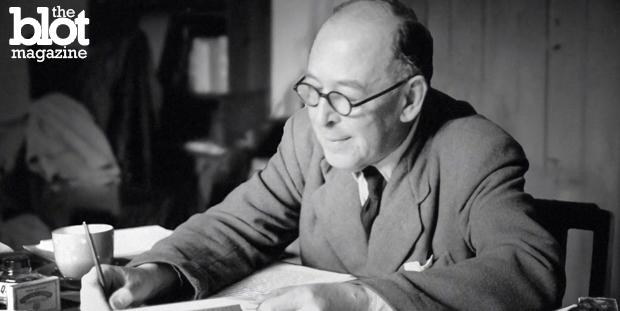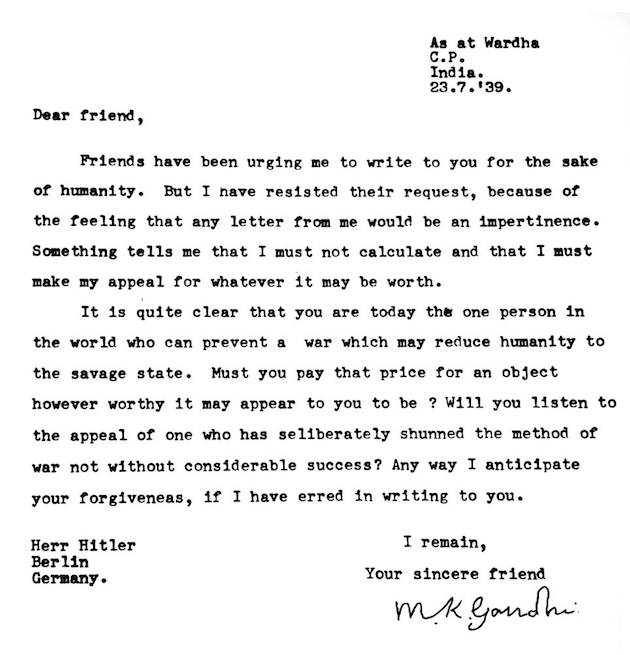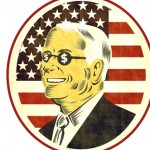
A text or an e-mail is something you probably write and receive every day. You might even get dozens, if not hundreds of them on a daily or weekly basis. Communication in the modern era, at least as far as getting the words (if not the intended meaning) into the hands of the recipient, is a binary breeze.
Not so long ago, people had to write letters on actual paper. While the information we receive in a text or digital message might be life-changing on occasion (the tumor is benign), the platform it arrives on is no longer something we cherish. Boxes of old letters hold value for some. Boxes of meaningful tweets do not.
Here are five historical letters, written with a pen or typed on a piece of paper, that did or could have changed history — or at the very least, one person’s life.
1. Gandhi’s Letter to Hitler
Mahatma Gandhi wrote a letter to Adolf Hitler in 1939 and made a reasonable request. Simply put, he asked the German dictator to end the war that he was about to kick off. While describing himself as someone who had “deliberately shunned the method of war not without considerable success,” Gandhi asked Hitler to “prevent a war which may reduce humanity to a savage state.”
The famed independence leader even apologized in case he had “erred in writing” the Führer. If only that little mustachioed German had listened, tens of millions of lives could have been saved.
2. C.S. Lewis Writes an American Admirer
C.S. Lewis, probably best known for his “Narnia” series, once wrote an American admirer a kind and thoughtful letter full of grammar and general writing advice. Lewis even pointed out linguist divergences in English as spoken in different parts of the world (Northern Ireland versus Southern England versus Florida).
The famous author also touched on the “show don’t tell” mantra of fiction writing in the 1956 letter, which must have left the intended reader (Joan Lancaster) glowing at the thought of her own potential future literary career.
3. Martin Luther King’s Open Letter From a Birmingham Jail
Martin Luther King Jr.’s 1963 “Letter from Birmingham Jail,” written from a cell after he’d been arrested while demonstrating in Alabama, was addressed to the white clergymen who’d advised members of the black community to stop protesting. In the letter, King eloquently explained why the need to stay committed to the ideals of nonviolent resistance in the face of segregation was so important.
While the lengthy correspondence, cobbled together from various bits of paper and notepads (writing in jail under guard isn’t always easy) was never sent to the clergymen, it became a beautiful and defining moment in the American Civil Rights Movement.
4. Elvis Presley’s Letter to President Nixon
Yes, Elvis wrote a letter Nixon in 1970. And what did Mr. Presley want to tell the President of the United States? As it turns out, the celebrated singer wanted to give Nixon a gift (a World War II pistol), and secure employment as a federal agent in order to help the country fight the war on drugs. Really, all true.
Elvis delivered the handwritten letter to the White House himself, and as a result, got a meeting with the Commander in Chief. Sadly, though, Presley was never let out into the field as a working federal agent.

5. The King of Macedon’s Letter to Ancient Sparta
Philip II, father of Alexander the Great, wrote an open letter of sorts to Sparta circa 346 B.C., letting the famed warrior society know in no uncertain terms what he planned to do with them once they were conquered. While accounts vary to some extant on exactly how wordy the initial message was, the gist of the letter boiled down to: “If I win this war, you will be slaves forever.”
Legend has it the Spartans, who would naturally be “spartan” in their response, answered the threatening letter with a one-word reply: “If.”
While Philip wreaked havoc across most of Greece, after receiving the simple Spartan answer to his menacing letter, the Macedon King avoided the proud city-state entirely, leaving the fierce Spartans alone.
Carl Pettit is a contributing journalist for TheBlot Magazine.






